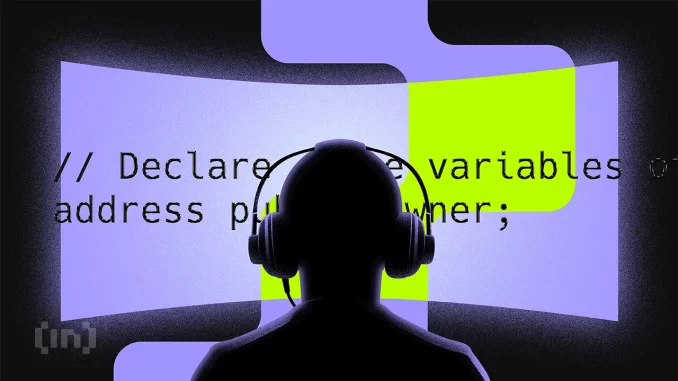
Blockchain technology is revolutionizing the digital world and financial system. The prospect of learning to program these complex systems can seem daunting. However, insights from a well-known blockchain developer suggest that this journey might be more accessible than many anticipate.
Indeed, the learning curve for those interested in programming blockchains and developing smart contracts might not be as steep as one might think.
Start With the Basics
Jhony Grillet, CEO of El Aguacate Programador, told BeInCrypto about the importance of focusing on basic concepts with specific demos from particular blockchain stacks. This approach contrasts with trying to cover every aspect of a vast project. His perspective aligns with the broader challenge in Web3 education – the need to concentrate on a few core elements rather than chasing every new trend.
A significant advantage mentioned by Grillet is the use of familiar programming languages like JavaScript. This familiarity provides an easier entry point for those new to blockchain programming. On Hive, for instance, even those with a basic understanding of JavaScript can interact with nodes and explore various features.
Read more: Top Programming Languages Used in Blockchain Development
This accessibility is not always the norm in other blockchain stacks, where learning new languages like Solidity, Rust, or Go, is often required. For this reason, Grillet believes that making mistakes and sharing this knowledge is one of the best ways to learn. This methodology promotes a more inclusive and less isolating learning environment.
Therefore, engaging with online communities, utilizing available documentation, and following tutorials are also crucial.
“I think the best way of learning is committing to error and showing communities how not to do things. Showing honesty and vulnerability makes learning progress less of an island for most people, not just for blockchain but in general,” Grillet said.
He also highlighted the importance of early adopters in shaping and improving products through community feedback.
“We are the early adopters that need to be listened to. If you want your product massively adopted, you share the initial product, use your community as a beta tester, listen, and then improve your product. It is a proven strategy to most products and features in blockchain and every aspect of technology,” Grillet explained.
Ask a Lot of Questions
For those seeking structured learning, Web3 University and BeInCrypto’s Learn offer comprehensive programs. However, Grillet believes that the best learning often comes from asking questions. He affirmed that exploring the abundant content available online across various blockchain ecosystems can offer great insights.
He also advocated for a more selective approach to learning, focusing on specific content at a manageable pace. Grillet mentioned the common use of JavaScript in Web3, allowing programmers to leverage their existing skills in building front-end applications that interact with blockchains.
“JavaScript is the language of the Web2, it is common sense to have such paradigm in Web3, despite the stack you choose after. Also, JavaScript allows you to use your base knowledge to start building front-end apps that consume blockchain as a database, as a service, or the way your blockchain lets you use it,” Grillet added.
The proliferation of online learning platforms presents both opportunities and challenges. While they offer a wealth of information, Grillet noted the risk of overwhelming learners with too much content, leading to a trend where people accumulate courses rather than absorbing knowledge.
He believes in a more focused approach that focuses on specific needs for blockchain programming. One way is bootcamp programs, which are an ideal learning option for blockchain developers, according to Columbia University.
“[Bootcamps] simulate real-world industry work projects and challenges in a controlled setting. Students are able to follow a flexible, yet thorough curriculum rooted in practical instruction and hands-on learning; preparing for a seamless transition into a full-time blockchain development career,” Columbia University wrote.
Read more: 4 Best Crypto Learn and Earn Platforms in 2024
The future of blockchain education, as envisioned by Grillet, lies in adaptive learning paths, a prospect made increasingly feasible through the capabilities of blockchain technology itself.
Disclaimer
Following the Trust Project guidelines, this feature article presents opinions and perspectives from industry experts or individuals. BeInCrypto is dedicated to transparent reporting, but the views expressed in this article do not necessarily reflect those of BeInCrypto or its staff. Readers should verify information independently and consult with a professional before making decisions based on this content. Please note that our Terms and Conditions, Privacy Policy, and Disclaimers have been updated.





Be the first to comment